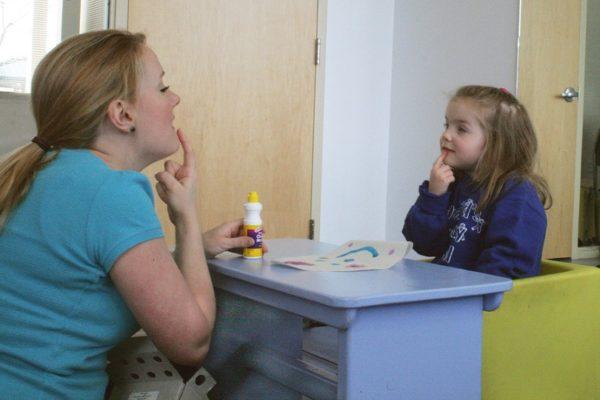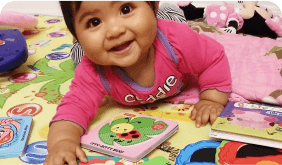Let me guess…they help with speech and language? Yes, but they do so much more! So, what exactly is a pediatric speech language pathologist?
Pediatric speech-language pathologists work to help children communicate effectively by assisting with the improvement of their verbal and non-verbal language skills. They also help with things like feeding and swallowing abilities. Seriously, how often do you actually think about how you chew? It takes a lot of muscles in your mouth!

Pediatric speech-language pathologists work with children of all ages, from newborns to teenagers, to help with all of these skills.
Some of these skills you might not have even considered before reading this blog.
In addition to specializing in treating feeding and swallowing disorders, speech-language pathologists focus on improving three areas of communication:
Speech
When therapists work with children on speech, they’re looking to improve children’s articulation, decrease stuttering (disfluency), or treat voice disorders.
 Receptive Language
Receptive Language
When therapists work with children to improve their receptive language, they are helping children process and understand the information they’re receiving from others. Take following directions for example! When a therapist tells a child to “pick up the toy and put it in the basket,” the child has to take in all that information: knowing what a toy is, knowing what a basket is, understanding that they’re meant to do an action, etc. There’s a lot they need receptive language skills for just in that one sentence!
Expressive Language
When therapists work with children on expressive language, they are helping children learn how to produce words and combine words into phrases and sentences to outwardly communicate their wants and needs and share information. For example, when a therapist helps a child who wants a glass of water go from saying, “Water,” to “I want water, please,” they are working on expressive language!
When A Child Might Need To See a SLP?
Children see speech-language pathologists for a variety of reasons, including difficulty:
Feeding or swallowing – unable to safely eat or drink age-appropriate foods and liquids
Articulating certain sounds
With fluent speech – stuttering
Using words, phrases, and sentences to communicate at an age appropriate level – needs help using words to communicate and/or turning words into phrases
Understanding information such as directions or questions – needs help understanding words spoken to them
Organizing information and regulating behavior
How They Help Children
Each child is different! Once an initial assessment is performed, the speech-language pathologist will determine the best course of action. Interventions vary depending on what communication or feeding and swallowing goals will be targeted.

Speech-language pathologists strive to make every therapy session feel like play, especially for their youngest clients! To improve articulation, speech-language pathologists might have a child play with a baby doll and pretend to feed it, naming and talking about pre-selected or strategically selected food to improve their articulation of certain sounds. Playing with the doll and practicing targeted sounds is fun and therapeutic for children at the same time. To target a child’s receptive language and/or executive functioning goals, a therapist may create a fun, motivating obstacle course where the child needs to follow specific directions and recall a sequence of events.
Speech-language pathologists give parents and children the tools they need to improve their language skills, but therapists say it’s the time spent using those tools at home and in the children’s natural environment that really creates lasting change. Practicing what is learned at the therapy appointments is just as important as the appointments themselves. Parents should ask therapists what goals and strategies can be carried over into the home environment to improve speech and language skills.
Remember, treatment options will vary for each child as will duration of therapy. For specific questions about your child, be sure to consult with their healthcare provider.





